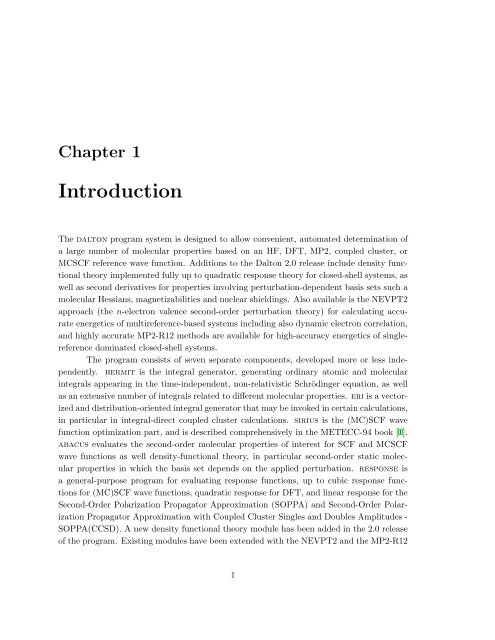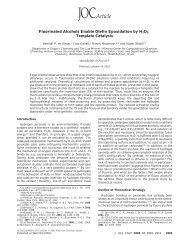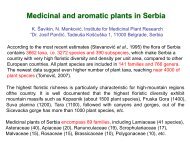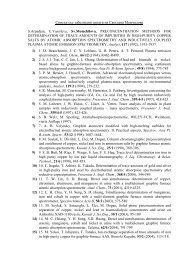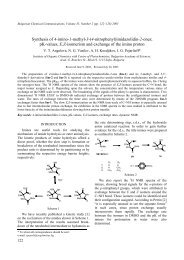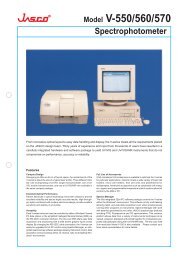- Page 1 and 2: DALTON Release 2 Program Manual C.
- Page 3 and 4: CONTENTS ii 5.1.2 A RASSCF calculat
- Page 5 and 6: CONTENTS iv 16 Vibrational correcti
- Page 7 and 8: CONTENTS vi 24.2.17 *STEP CONTROL .
- Page 9: Preface This is the documentation f
- Page 13 and 14: Chapter 2 New features in Dalton 2.
- Page 15 and 16: CHAPTER 2. NEW FEATURES IN DALTON 6
- Page 17 and 18: CHAPTER 2. NEW FEATURES IN DALTON 8
- Page 19 and 20: Part I DALTON Installation Guide 10
- Page 21 and 22: CHAPTER 3. INSTALLATION 12 document
- Page 23 and 24: CHAPTER 3. INSTALLATION 14 Cray), a
- Page 25 and 26: Chapter 4 Maintenance 4.1 Memory re
- Page 27 and 28: CHAPTER 4. MAINTENANCE 18 One may b
- Page 29 and 30: Chapter 5 Getting started with dalt
- Page 31 and 32: CHAPTER 5. GETTING STARTED WITH DAL
- Page 33 and 34: CHAPTER 5. GETTING STARTED WITH DAL
- Page 35 and 36: CHAPTER 5. GETTING STARTED WITH DAL
- Page 37 and 38: CHAPTER 5. GETTING STARTED WITH DAL
- Page 39 and 40: CHAPTER 5. GETTING STARTED WITH DAL
- Page 41 and 42: CHAPTER 6. GETTING THE WAVE FUNCTIO
- Page 43 and 44: CHAPTER 6. GETTING THE WAVE FUNCTIO
- Page 45 and 46: CHAPTER 6. GETTING THE WAVE FUNCTIO
- Page 47 and 48: CHAPTER 6. GETTING THE WAVE FUNCTIO
- Page 49 and 50: CHAPTER 6. GETTING THE WAVE FUNCTIO
- Page 51 and 52: CHAPTER 6. GETTING THE WAVE FUNCTIO
- Page 53 and 54: CHAPTER 6. GETTING THE WAVE FUNCTIO
- Page 55 and 56: Chapter 7 Potential energy surfaces
- Page 57 and 58: CHAPTER 7. POTENTIAL ENERGY SURFACE
- Page 59 and 60: CHAPTER 7. POTENTIAL ENERGY SURFACE
- Page 61 and 62:
CHAPTER 7. POTENTIAL ENERGY SURFACE
- Page 63 and 64:
CHAPTER 7. POTENTIAL ENERGY SURFACE
- Page 65 and 66:
CHAPTER 7. POTENTIAL ENERGY SURFACE
- Page 67 and 68:
CHAPTER 7. POTENTIAL ENERGY SURFACE
- Page 69 and 70:
CHAPTER 7. POTENTIAL ENERGY SURFACE
- Page 71 and 72:
CHAPTER 7. POTENTIAL ENERGY SURFACE
- Page 73 and 74:
Chapter 8 Molecular vibrations In t
- Page 75 and 76:
CHAPTER 8. MOLECULAR VIBRATIONS 66
- Page 77 and 78:
CHAPTER 8. MOLECULAR VIBRATIONS 68
- Page 79 and 80:
Chapter 9 Electric properties This
- Page 81 and 82:
CHAPTER 9. ELECTRIC PROPERTIES 72 .
- Page 83 and 84:
Chapter 10 Calculation of magnetic
- Page 85 and 86:
CHAPTER 10. CALCULATION OF MAGNETIC
- Page 87 and 88:
CHAPTER 10. CALCULATION OF MAGNETIC
- Page 89 and 90:
CHAPTER 10. CALCULATION OF MAGNETIC
- Page 91 and 92:
CHAPTER 10. CALCULATION OF MAGNETIC
- Page 93 and 94:
CHAPTER 10. CALCULATION OF MAGNETIC
- Page 95 and 96:
CHAPTER 10. CALCULATION OF MAGNETIC
- Page 97 and 98:
CHAPTER 10. CALCULATION OF MAGNETIC
- Page 99 and 100:
CHAPTER 11. CALCULATION OF OPTICAL
- Page 101 and 102:
CHAPTER 11. CALCULATION OF OPTICAL
- Page 103 and 104:
CHAPTER 11. CALCULATION OF OPTICAL
- Page 105 and 106:
CHAPTER 11. CALCULATION OF OPTICAL
- Page 107 and 108:
CHAPTER 11. CALCULATION OF OPTICAL
- Page 109 and 110:
CHAPTER 12. GETTING THE PROPERTY YO
- Page 111 and 112:
CHAPTER 12. GETTING THE PROPERTY YO
- Page 113 and 114:
CHAPTER 12. GETTING THE PROPERTY YO
- Page 115 and 116:
Chapter 13 Direct and parallel calc
- Page 117 and 118:
Chapter 14 Finite field calculation
- Page 119 and 120:
CHAPTER 14. FINITE FIELD CALCULATIO
- Page 121 and 122:
CHAPTER 15. SOLVENT CALCULATIONS 11
- Page 123 and 124:
CHAPTER 15. SOLVENT CALCULATIONS 11
- Page 125 and 126:
CHAPTER 15. SOLVENT CALCULATIONS 11
- Page 127 and 128:
CHAPTER 16. VIBRATIONAL CORRECTIONS
- Page 129 and 130:
CHAPTER 16. VIBRATIONAL CORRECTIONS
- Page 131 and 132:
CHAPTER 16. VIBRATIONAL CORRECTIONS
- Page 133 and 134:
CHAPTER 17. RELATIVISTIC EFFECTS 12
- Page 135 and 136:
CHAPTER 18. SOPPA AND SOPPA(CCSD) C
- Page 137 and 138:
CHAPTER 18. SOPPA AND SOPPA(CCSD) C
- Page 139 and 140:
CHAPTER 19. NEVPT2 CALCULATIONS 130
- Page 141 and 142:
CHAPTER 20. EXAMPLES OF COUPLED CLU
- Page 143 and 144:
CHAPTER 20. EXAMPLES OF COUPLED CLU
- Page 145 and 146:
CHAPTER 20. EXAMPLES OF COUPLED CLU
- Page 147 and 148:
Chapter 21 General input module In
- Page 149 and 150:
CHAPTER 21. GENERAL INPUT MODULE 14
- Page 151 and 152:
CHAPTER 21. GENERAL INPUT MODULE 14
- Page 153 and 154:
CHAPTER 21. GENERAL INPUT MODULE 14
- Page 155 and 156:
CHAPTER 21. GENERAL INPUT MODULE 14
- Page 157 and 158:
CHAPTER 21. GENERAL INPUT MODULE 14
- Page 159 and 160:
CHAPTER 21. GENERAL INPUT MODULE 15
- Page 161 and 162:
CHAPTER 21. GENERAL INPUT MODULE 15
- Page 163 and 164:
CHAPTER 21. GENERAL INPUT MODULE 15
- Page 165 and 166:
CHAPTER 21. GENERAL INPUT MODULE 15
- Page 167 and 168:
CHAPTER 21. GENERAL INPUT MODULE 15
- Page 169 and 170:
CHAPTER 21. GENERAL INPUT MODULE 16
- Page 171 and 172:
CHAPTER 22. INTEGRAL EVALUATION, HE
- Page 173 and 174:
CHAPTER 22. INTEGRAL EVALUATION, HE
- Page 175 and 176:
CHAPTER 22. INTEGRAL EVALUATION, HE
- Page 177 and 178:
CHAPTER 22. INTEGRAL EVALUATION, HE
- Page 179 and 180:
CHAPTER 22. INTEGRAL EVALUATION, HE
- Page 181 and 182:
CHAPTER 22. INTEGRAL EVALUATION, HE
- Page 183 and 184:
CHAPTER 22. INTEGRAL EVALUATION, HE
- Page 185 and 186:
CHAPTER 22. INTEGRAL EVALUATION, HE
- Page 187 and 188:
CHAPTER 22. INTEGRAL EVALUATION, HE
- Page 189 and 190:
CHAPTER 22. INTEGRAL EVALUATION, HE
- Page 191 and 192:
CHAPTER 22. INTEGRAL EVALUATION, HE
- Page 193 and 194:
CHAPTER 22. INTEGRAL EVALUATION, HE
- Page 195 and 196:
Chapter 23 molecule input style The
- Page 197 and 198:
CHAPTER 23. MOLECULE INPUT STYLE 18
- Page 199 and 200:
CHAPTER 23. MOLECULE INPUT STYLE 19
- Page 201 and 202:
CHAPTER 23. MOLECULE INPUT STYLE 19
- Page 203 and 204:
CHAPTER 23. MOLECULE INPUT STYLE 19
- Page 205 and 206:
CHAPTER 23. MOLECULE INPUT STYLE 19
- Page 207 and 208:
CHAPTER 23. MOLECULE INPUT STYLE 19
- Page 209 and 210:
CHAPTER 23. MOLECULE INPUT STYLE 20
- Page 211 and 212:
Chapter 24 Molecular wave functions
- Page 213 and 214:
CHAPTER 24. MOLECULAR WAVE FUNCTION
- Page 215 and 216:
CHAPTER 24. MOLECULAR WAVE FUNCTION
- Page 217 and 218:
CHAPTER 24. MOLECULAR WAVE FUNCTION
- Page 219 and 220:
CHAPTER 24. MOLECULAR WAVE FUNCTION
- Page 221 and 222:
CHAPTER 24. MOLECULAR WAVE FUNCTION
- Page 223 and 224:
CHAPTER 24. MOLECULAR WAVE FUNCTION
- Page 225 and 226:
CHAPTER 24. MOLECULAR WAVE FUNCTION
- Page 227 and 228:
CHAPTER 24. MOLECULAR WAVE FUNCTION
- Page 229 and 230:
CHAPTER 24. MOLECULAR WAVE FUNCTION
- Page 231 and 232:
CHAPTER 24. MOLECULAR WAVE FUNCTION
- Page 233 and 234:
CHAPTER 24. MOLECULAR WAVE FUNCTION
- Page 235 and 236:
CHAPTER 24. MOLECULAR WAVE FUNCTION
- Page 237 and 238:
CHAPTER 24. MOLECULAR WAVE FUNCTION
- Page 239 and 240:
CHAPTER 24. MOLECULAR WAVE FUNCTION
- Page 241 and 242:
CHAPTER 24. MOLECULAR WAVE FUNCTION
- Page 243 and 244:
Chapter 25 HF, SOPPA, and MCSCF mol
- Page 245 and 246:
CHAPTER 25. HF, SOPPA, AND MCSCF MO
- Page 247 and 248:
CHAPTER 25. HF, SOPPA, AND MCSCF MO
- Page 249 and 250:
CHAPTER 25. HF, SOPPA, AND MCSCF MO
- Page 251 and 252:
CHAPTER 25. HF, SOPPA, AND MCSCF MO
- Page 253 and 254:
CHAPTER 25. HF, SOPPA, AND MCSCF MO
- Page 255 and 256:
CHAPTER 25. HF, SOPPA, AND MCSCF MO
- Page 257 and 258:
CHAPTER 25. HF, SOPPA, AND MCSCF MO
- Page 259 and 260:
CHAPTER 25. HF, SOPPA, AND MCSCF MO
- Page 261 and 262:
CHAPTER 25. HF, SOPPA, AND MCSCF MO
- Page 263 and 264:
CHAPTER 25. HF, SOPPA, AND MCSCF MO
- Page 265 and 266:
CHAPTER 25. HF, SOPPA, AND MCSCF MO
- Page 267 and 268:
CHAPTER 25. HF, SOPPA, AND MCSCF MO
- Page 269 and 270:
CHAPTER 25. HF, SOPPA, AND MCSCF MO
- Page 271 and 272:
CHAPTER 25. HF, SOPPA, AND MCSCF MO
- Page 273 and 274:
CHAPTER 25. HF, SOPPA, AND MCSCF MO
- Page 275 and 276:
Chapter 26 Linear and non-linear re
- Page 277 and 278:
CHAPTER 26. LINEAR AND NON-LINEAR R
- Page 279 and 280:
CHAPTER 26. LINEAR AND NON-LINEAR R
- Page 281 and 282:
CHAPTER 26. LINEAR AND NON-LINEAR R
- Page 283 and 284:
CHAPTER 26. LINEAR AND NON-LINEAR R
- Page 285 and 286:
CHAPTER 26. LINEAR AND NON-LINEAR R
- Page 287 and 288:
CHAPTER 26. LINEAR AND NON-LINEAR R
- Page 289 and 290:
CHAPTER 26. LINEAR AND NON-LINEAR R
- Page 291 and 292:
CHAPTER 26. LINEAR AND NON-LINEAR R
- Page 293 and 294:
CHAPTER 26. LINEAR AND NON-LINEAR R
- Page 295 and 296:
CHAPTER 26. LINEAR AND NON-LINEAR R
- Page 297 and 298:
CHAPTER 26. LINEAR AND NON-LINEAR R
- Page 299 and 300:
Chapter 27 Coupled-cluster calculat
- Page 301 and 302:
CHAPTER 27. COUPLED-CLUSTER CALCULA
- Page 303 and 304:
CHAPTER 27. COUPLED-CLUSTER CALCULA
- Page 305 and 306:
CHAPTER 27. COUPLED-CLUSTER CALCULA
- Page 307 and 308:
CHAPTER 27. COUPLED-CLUSTER CALCULA
- Page 309 and 310:
CHAPTER 27. COUPLED-CLUSTER CALCULA
- Page 311 and 312:
CHAPTER 27. COUPLED-CLUSTER CALCULA
- Page 313 and 314:
CHAPTER 27. COUPLED-CLUSTER CALCULA
- Page 315 and 316:
CHAPTER 27. COUPLED-CLUSTER CALCULA
- Page 317 and 318:
CHAPTER 27. COUPLED-CLUSTER CALCULA
- Page 319 and 320:
CHAPTER 27. COUPLED-CLUSTER CALCULA
- Page 321 and 322:
CHAPTER 27. COUPLED-CLUSTER CALCULA
- Page 323 and 324:
CHAPTER 27. COUPLED-CLUSTER CALCULA
- Page 325 and 326:
CHAPTER 27. COUPLED-CLUSTER CALCULA
- Page 327 and 328:
CHAPTER 27. COUPLED-CLUSTER CALCULA
- Page 329 and 330:
CHAPTER 27. COUPLED-CLUSTER CALCULA
- Page 331 and 332:
CHAPTER 27. COUPLED-CLUSTER CALCULA
- Page 333 and 334:
Part IV Appendix: DALTON Tool box 3
- Page 335 and 336:
326 A2: labread Author: Hans Jørge
- Page 337 and 338:
328 Need 0 0 0 Need 0 0 z Need 0 0
- Page 339 and 340:
Bibliography [1] H. J. Aa. Jensen,
- Page 341 and 342:
BIBLIOGRAPHY 332 [28] T. Helgaker,
- Page 343 and 344:
BIBLIOGRAPHY 334 [56] K. Ruud, T. H
- Page 345 and 346:
BIBLIOGRAPHY 336 [82] K. Ruud, T. H
- Page 347 and 348:
BIBLIOGRAPHY 338 [107] C. Angeli, S
- Page 349 and 350:
BIBLIOGRAPHY 340 [133] R. van Leeuw
- Page 351 and 352:
BIBLIOGRAPHY 342 [168] H. Ågren, O
- Page 353 and 354:
BIBLIOGRAPHY 344 [194] W. T. Raynes
- Page 355 and 356:
Index **DALTON, 21, 50, 57, 59, 67,
- Page 357 and 358:
INDEX 348 .C10LMO, 276 .C10SPH, 275
- Page 359 and 360:
INDEX 350 CTOCD-DZ,CTOCD-DZ diamagn
- Page 361 and 362:
INDEX 352 eigenvector, 148, 150 ele
- Page 363 and 364:
INDEX 354 coordinate system, 48 equ
- Page 365 and 366:
INDEX 356 iteration number DIIS, ma
- Page 367 and 368:
INDEX 358 .MP2, 70, 73-77, 79, 90,
- Page 369 and 370:
INDEX 360 nuclear dipole moment, 10
- Page 371 and 372:
INDEX 362 print level, 138 *PRINT L
- Page 373 and 374:
INDEX 364 .RESTPP, 267 restricted-u
- Page 375 and 376:
INDEX 366 spin-rotation constant, 7
- Page 377 and 378:
INDEX 368 amplitude, 101 transition


